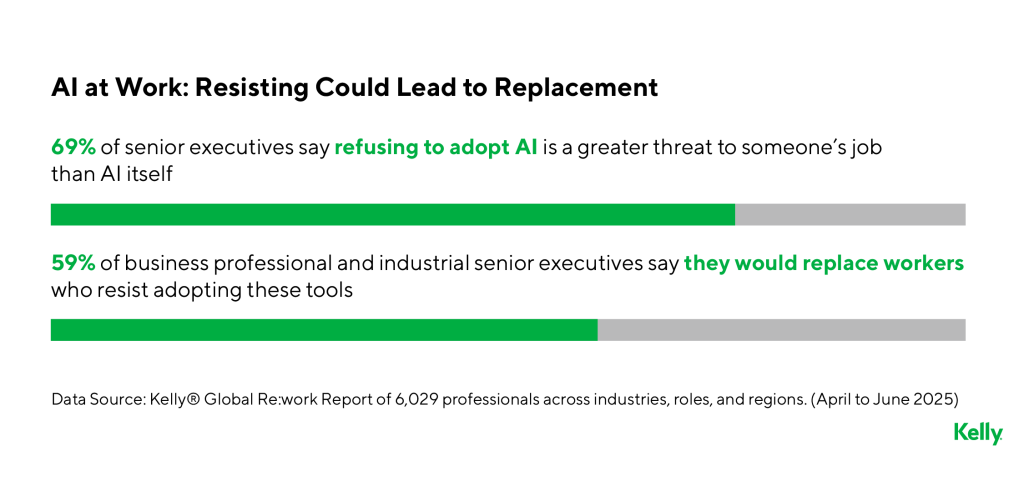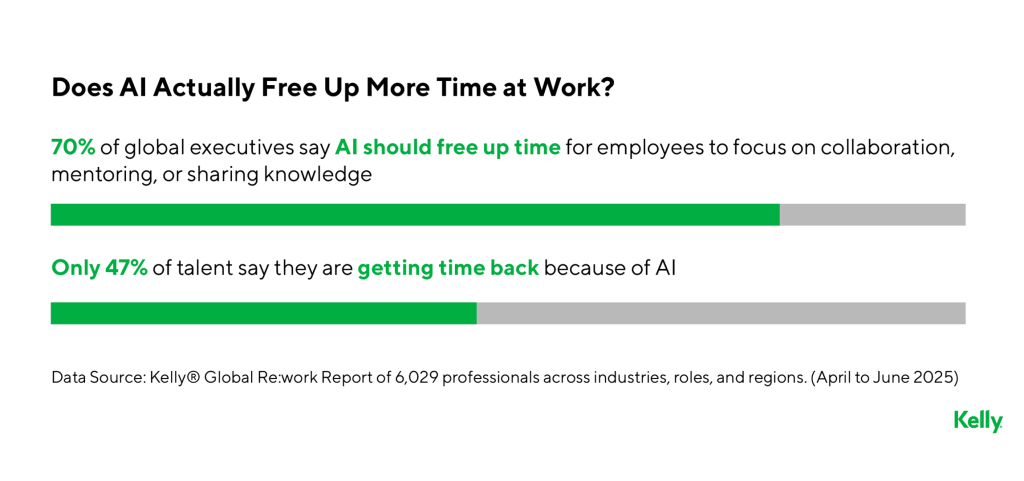
AI isn’t yet coming for your job, but ignoring it would be a mistake
AI isn’t yet coming for your job, but ignoring it would be a mistake
Artificial intelligence has become the coworker who never sleeps. It drafts, analyzes and recommends at a pace people cannot match. But instead of comfort, it brings a mix of excitement and unease, leaving many workers unsure whether AI is here to support or outpace them.
That tension between curiosity and caution is showing up in workplaces across the world, according to new research from Kelly. While many workers remain skeptical of AI, senior executives view acquiring AI skills as essential to long-term career success. Nearly seven in ten executives say ignoring AI is more likely to cost someone their job than the technology itself, and more than half say they would replace workers who resist adopting these tools.

Still, about half of workers say they do not view AI as a serious concern. The divide is not about layoffs. It is about trust. Leaders see innovation. Employees see uncertainty.
Across industries, that gap is changing how people experience their jobs. Executives report productivity gains from AI tools, but fewer than half of workers say they are actually getting that time back. Some workers describe tools that promise to simplify work but instead add new layers of complexity. Others say they are unsure when or how to use them.
Ambition versus reality
Most companies already use AI in some form, from streamlining workflows to guiding decisions, but many are still figuring out how to make it work. Technical hurdles slow down some teams. Others simply are not trained. About one-third of executives in business and industrial sectors say employees are slow to adopt new tools, and nearly half say technical challenges get in the way.
That gap has real consequences. Companies pouring money into AI risk losing both time and trust if employees do not understand how to use it. Workers who do not see clear benefits often revert to familiar workflows and manual routines, and the promised gains never materialize.
The perception problem
Workers are not worried about being replaced by AI. They are worried about what it means for their day-to-day work. They want to know how it will change expectations, affect workloads and shape the skills they’ll need next. Without that clarity, skepticism grows.
Leaders say AI should free people to do more meaningful work like mentoring, problem-solving and innovation. But when that promise doesn’t materialize at work, optimism from the top can sound out of touch. Managers who assume enthusiasm is universal may miss the concerns that quietly slow progress.

Training and transparency can change that. Companies that clearly explain to their employees why AI matters, show how it can be applied to real work, and define success beyond productivity, see faster adoption and stronger engagement.
Trust over technology
AI adoption depends as much on people as software. AI can automate tasks, but it cannot build the confidence and security employees need to embrace new ways of working. Trust comes from leaders, not software. Workers who feel supported through change are more willing to experiment, fail and learn. Those who feel left behind may resist even the simplest tools.
The research suggests that successful organizations treat AI as a partnership between people and technology. They connect learning to advancement, gather feedback and make sure employees can see progress.
That approach turns fear into confidence. When workers understand how AI helps them grow, not just how it helps the company, they are far more likely to embrace it.
Moving forward
The story of AI at work is not about machines replacing people. It is about how quickly people and organizations can adapt together. Ignoring the technology will not stop it from reshaping industries, and adopting it without guidance will not build trust.
Leaders may see AI as the future of work. The real test is convincing their teams that it is a future worth building.
This story was produced by Kelly and reviewed and distributed by Stacker.



